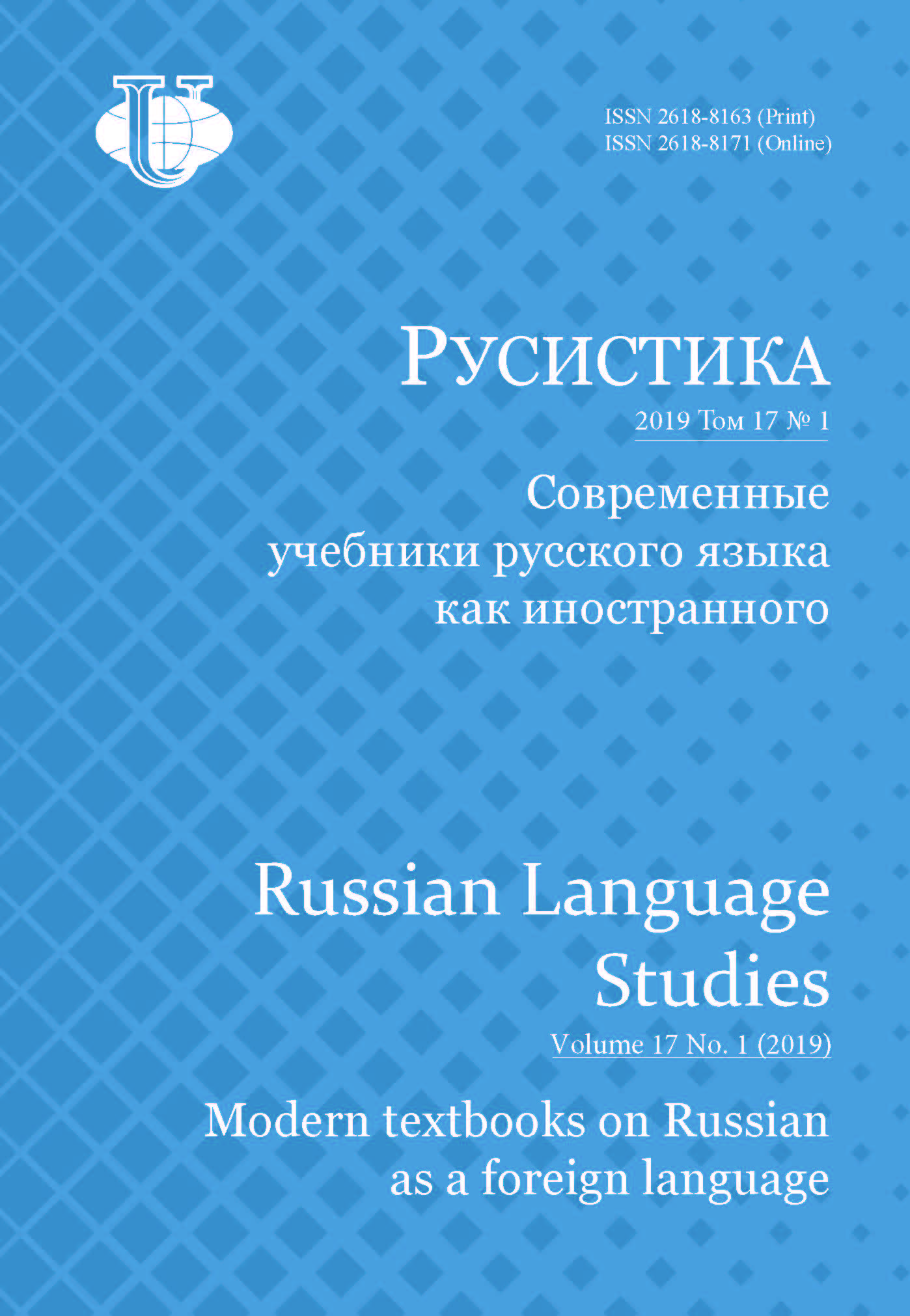What a textbook on Russian as a foreign language for adult students should be
- Authors: Kozdra M.1
-
Affiliations:
- The University of Warsaw
- Issue: Vol 17, No 1 (2019): MODERN TEXTBOOKS ON RUSSIAN AS A FOREIGN LANGUAGE
- Pages: 78-89
- Section: Methods of teaching russian as a foreign language
- URL: https://journals.rudn.ru/russian-language-studies/article/view/20498
- DOI: https://doi.org/10.22363/2618-8163-2019-17-1-78-89
Cite item
Full Text
Abstract
The aim of the paper is to set out the principles of writing a modern effective textbook on Russian as a foreign language (RFL) for adult learners from the position of Adult Learning Theory (ALT). The relevance of this topic is related to the fact that there is no modern, effective textbook of Russian as a foreign language for adults on the market of teaching and learning aids. Existing textbooks are focused primarily on students and young people. They often do not correspond to the real needs of adult learners. The introduction of the article examines the main elements of a textbook for teaching RFL: its function, content, methodology and structure, as well as the main statements of the theory of ALT. In the second part, the main shortcomings and drawbacks of the existing textbooks for teaching RFL are highlighted, and specific examples are shown as well. In the third part, the principles of writing a modern textbook for adults are revealed: the functions of such a manual are outlined, the content is described, the method is defined, and its structure is sketched out.
About the authors
Michał Kozdra
The University of Warsaw
Author for correspondence.
Email: m.kozdra@uw.edu.pl
Ph.D. in Linguistics, Assistant Professor at the Faculty of Applied Linguistics, University of Warsaw. Co-author and member of the Lexicographical Research Laboratory of the Institute of Russian Studies at the University of Warsaw, member of the editorial board of the scientific journal “Linguistics and Anthropology”
26/28 Krakowskie Przedmieście St., Warsaw, 00-927, PolandReferences
- Agapova, O.V., Vershlovskii, S.G., & Ermolaeva, M.G. (2007). Uroki dlya vzroslykh: posobie dlya tekh, kto rabotaet v sisteme obrazovaniya vzroslykh [Lessons for Adults: a Guide for Those Who Work in the Adult Education System]. Saint Petersburg: Nemetskaya assotsiatsiya narodnykh universitetov Publ. (In Russ.)
- Azimov, E.G., & Shchukin, A.N. (2010). New Dictionary of Methodological Terms and Concepts (Theory and Practice of Language Teaching). Gramota.ru. Retrieved September 27 2018 from: http:// gramota.ru/slovari/info/az/
- Funk, H. (2010). Methodische Konzepte für den DaF-Unterricht — Grundlagen, Prinzipien, Lernfelder und Modelle. Hans-Jürgen Krumm, Christian Fandrych, Britta Hufeisen, Claudia Riemer (Eds). Deutsch als Fremd- und Zweitsprache. Ein internationales Handbuch. Berlin, New York: Mouton de Gruyter Publ. (In Germ.)
- Knowles, M.S., Holton III, E.F., & Swanson, R.A. (2011). The Adult Learner: The Definitive Classic in Adult Education and Human Resource Development. 7th edition. Amsterdam: Elsevier ButterworthHeinemann Publ.
- Kozdra, M. (2017). “Polisemioticheskie objekty” v obuchenii russkomu yazyku kak inostrannomu [“Polysemiotic Objects” in Teaching Russian as a Foreign Language]. Proceedings of the 1st International Scientific Congress of Young Scientists of Europe and Asia. Vienna: “East West” Association for Advanced Studies and Higher Education GmbH. (In Russ.)
- Kozdra, M. (2018). Mul’timodal’nost’ v obuchenii russkomu yazyku kak inostrannomu [Multimodality in Teaching Russian as a Foreign Language]. Actual Issues of Describing and Teaching Russian as a Foreign. Non-Native Language. Proceedings of The International Scientific and Practical Internet Conference (pp. 509—517). Moscow. (In Russ.)
- Kokh, M.N., & Peshkova, T.N. (2015). Osnovy pedagogiki i andragogiki: uchebnoe posobie [Basics of Pedagogy and Andragogy: textbook]. Krasnodar: KubGAU Publ. (In Russ.)
- Mil’rud, R.P. (2014). Uroki yazykovoi pedagogiki: mezhdu proshlym i budushchim [Lessons of Language Pedagogy: Between the Past and The Future]. Retrieved September 27 2018 from: http://iyazyki. ru/2014/11/language-pedagogy/
- Onorin, D.E. (2017). Osobennosti vzroslykh kak unikal’noi psikhologo-vozrastnoi gruppy obuchayushchikhsya pri ovladenii inostrannym yazykom [Characteristics of Adults as a Unique Psychological and Age Group of Students in Mastering a Foreign Language]. The world of science, 5(5). Retrieved September 27 2018 from: https://mir-nauki.com/PDF/36PSMN517.pdf
- Passov, E.I. (2009). Terminosistema metodiki, ili Kak my govorim i pishem [Terminosystem of Methodology, or How Do We Speak and Write]. Saint Petersburg: Zlatoust Publ. (In Russ.)
- Shkapenko, T.M. (2011). K voprosu kategorizatsii spetsificheskikh kommunikativnykh edinits [On The Issue of Categorization of Specific Communicative Units]. Bulletin of the Leningrad State University of A.S. Pushkin, 7(1), 222—226. Saint Petersburg: LGU imeni A. S. Pushkina Publ. (In Russ.)
- Shwiecka, I. (2009). Zajecia z doroslymi [Classes with Adults]. Effective Learning a Foreign Language. Structure and Course of Language Classes. Warszawa: Wydawnictwa Centralnego Ośrodka Doskonalenia Nauczycieli Publ. (In Polish)
- Zarochencev, K.D., & Hudyakov, A.I. (2005). Eksperimental’naya psikhologiya: uchebnik [Experimental Psychology: textbook]. Moscow: Prospekt Publ. (In Russ.)















